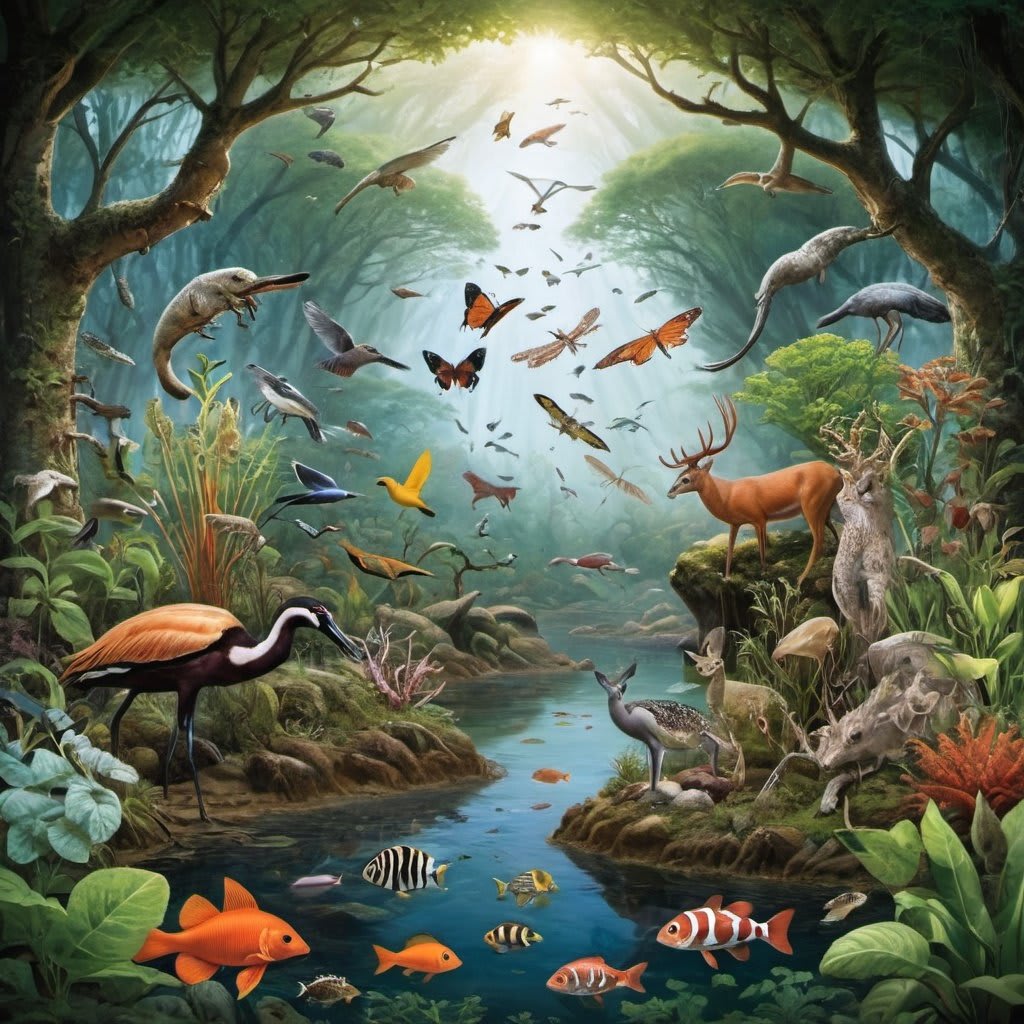Exploring the Foundations of Life
Ecosystems & their Biodiversity

Listen to the podcast on Spotify here: https://anchor.fm/earthingabout
Biodiversity and ecosystems are the fundamental building blocks of life on Earth, providing the foundation for thriving ecosystems, resilient communities, and a healthy planet. In this blog post, we'll delve into the definitions of biodiversity and ecosystems, explore their importance, and discuss how they interact to sustain life on our planet.
What is Biodiversity?
Biodiversity, short for biological diversity, refers to the variety of life forms found in a particular habitat or ecosystem. This diversity encompasses all living organisms, including plants, animals, fungi, bacteria, and microorganisms, as well as the genetic diversity within each species. Biodiversity can be observed at multiple levels, from the genetic diversity within individual populations to the variety of species within a community and the diversity of ecosystems across landscapes.
Why is Biodiversity Important?
Biodiversity is essential for the health and functioning of ecosystems and provides a wide range of ecological, economic, and cultural benefits:
Ecosystem Services: Biodiversity supports a variety of ecosystem services, including air and water purification, nutrient cycling, soil formation, pollination, and pest control. These services are critical for sustaining life on Earth and providing essential resources for human well-being.
Genetic Resources: Biodiversity serves as a vast reservoir of genetic resources that can be harnessed for agriculture, medicine, biotechnology, and other applications. Genetic diversity within species provides resilience to environmental changes and enables adaptation to new conditions.
Ecological Stability: Diverse ecosystems are more resilient to disturbances and environmental changes, such as climate change, habitat loss, and invasive species. High levels of biodiversity contribute to ecosystem stability and resilience, making them better able to withstand and recover from disturbances.
Cultural and Aesthetic Value: Biodiversity has cultural and aesthetic value, enriching human lives through recreation, inspiration, and cultural heritage. Many indigenous cultures have deep connections to the land and rely on biodiversity for spiritual, cultural, and subsistence purposes.
What are Ecosystems?
An ecosystem is a complex network of living organisms and their physical environment, interacting and functioning together as a self-regulating system. Ecosystems can vary greatly in size and complexity, ranging from small ponds or forests to vast oceans or grasslands. Each ecosystem is characterized by its unique combination of climate, geology, topography, and species composition.
Key Components of Ecosystems:
Abiotic Factors: Abiotic factors are non-living components of ecosystems, including sunlight, temperature, precipitation, soil, water, and nutrients. These physical and chemical factors shape the structure and function of ecosystems and influence the distribution and abundance of living organisms within them.
Biotic Factors: Biotic factors are living components of ecosystems, including plants, animals, fungi, bacteria, and other microorganisms. These organisms interact with each other and with their environment, forming complex food webs, nutrient cycles, and ecological relationships.
Trophic Levels: Ecosystems are organized into trophic levels, representing different levels of the food chain or food web. Producers, such as plants and algae, convert sunlight into energy through photosynthesis, forming the base of the food chain. Consumers, including herbivores, carnivores, and omnivores, feed on producers and other consumers, transferring energy and nutrients through the ecosystem.
Importance of Ecosystems:
Ecosystems provide a wide range of benefits and services essential for human well-being and environmental sustainability:
Habitat and Biodiversity: Ecosystems provide habitat for a diverse array of plant and animal species, supporting biodiversity and ecological resilience. Healthy ecosystems are essential for the survival of species and the maintenance of genetic diversity.
Regulation of Biogeochemical Cycles: Ecosystems regulate the flow of energy and nutrients through biogeochemical cycles, such as the carbon, nitrogen, and water cycles. These cycles are essential for maintaining the balance of Earth's atmosphere, climate, and nutrient cycles.
Climate Regulation: Ecosystems play a crucial role in regulating Earth's climate by sequestering carbon dioxide, mitigating greenhouse gas emissions, and influencing regional climate patterns. Forests, wetlands, and oceans are particularly important for climate regulation and carbon sequestration.
Water Resources: Ecosystems provide essential services for water management, including water filtration, groundwater recharge, flood regulation, and erosion control. Wetlands, forests, and riparian areas are particularly important for maintaining water quality and quantity.
Recreation and Tourism: Ecosystems provide opportunities for recreation, tourism, and outdoor activities, contributing to local economies and human well-being. National parks, wildlife reserves, and natural landscapes attract millions of visitors each year, generating revenue and supporting local communities.
In summary, biodiversity and ecosystems are essential components of life on Earth, providing the foundation for healthy ecosystems, resilient communities, and a sustainable future. By recognising the importance of biodiversity and ecosystems and supporting conservation efforts, we can work towards preserving these valuable resources for generations to come.
Thanks for reading
About the Creator
Charlotte Fay
Rambling outdoors & writing about it. Love a good adventure. Passionate about holistic wellness & the natural environment. Studying a Wildlife Ecology & Conservation Degree. I also love to write about a variety of subjects that interest me.






Comments
Charlotte Fay is not accepting comments at the moment
Want to show your support? Send them a one-off tip.